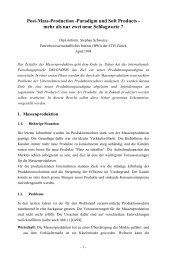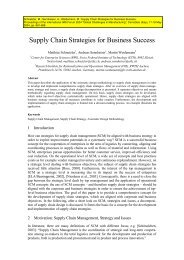The China Venture
The China Venture
The China Venture
You also want an ePaper? Increase the reach of your titles
YUMPU automatically turns print PDFs into web optimized ePapers that Google loves.
natural, is involved, or even where no foreign person is involved if the case has to do with<br />
international economic activities. <strong>The</strong> <strong>China</strong> International Economic and Trade Arbitration<br />
Com mission is prominent in <strong>China</strong>’s legal system because of its recognised independence<br />
from political control, its adherence to transparent and internationally endorsed arbitration<br />
procedures, and its reputation for fairness. 11<br />
2.2.5 Current problems of the operating legal system<br />
Despite the fact that the Chinese government has made tremendous efforts to built up a legal<br />
system meeting international standards, many problems still need to be solved.<br />
In contemporary <strong>China</strong> a big gap exists between the law on paper and the law in practice.<br />
Notwithstanding the large number of laws and regulations enacted since 1979, the<br />
implementation of law remains a major challenge to the nascent legal system. Official <strong>China</strong><br />
starts to realise that the implementation of law shall be the major task for the next stage of the<br />
legal development in the PRC. In addition to this, the concepts of supremacy of law and the<br />
rule of law are still not entirely accepted by governmental officials. <strong>The</strong> crucial issue here is<br />
whether the government and the CPC are subject to law, or whether law is merely an<br />
instrument in governing the country.<br />
Another big issue in discussion is the transparency and accessibility of laws and regulations in<br />
<strong>China</strong>. Lawyers working with foreign clients often point out that it is difficult to get access to<br />
the content of laws and regulations that apply to business operations. <strong>The</strong> dissemination of<br />
legal information in <strong>China</strong> is so underdeveloped, so unsystematic that it is often difficult<br />
simply to find the applicable law. Even when the relevant rule can be found, provisions are<br />
often so broad and sketchy that it is difficult to be certain of a correct interpretation. <strong>The</strong>re is<br />
also no systematic compilation of court decisions that would aid in the interpretation of<br />
statutes and regulations. In addition to that, there is the vexing problem of the internal agency<br />
rules. <strong>The</strong>se rules are not published and therefore inaccessible to outsiders. This is even more<br />
irritating because the internal rules are frequently the real rules under which the respective<br />
state organs operate.<br />
Law enforcement not only requires the formal establishment of courts and procuratorates. <strong>The</strong><br />
four levels of courts explained above, the Supreme People’s Court, twenty-nine high courts,<br />
11 In contrast, Chinese domestic arbitration cases are handled by the Industrial and Commercial<br />
Arbitration Commission, under the Bureau of Industry and Commerce, which is itself under the<br />
14






